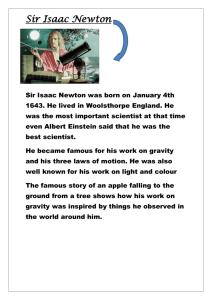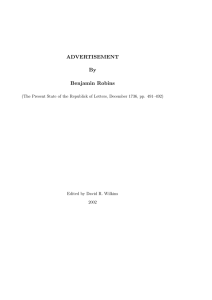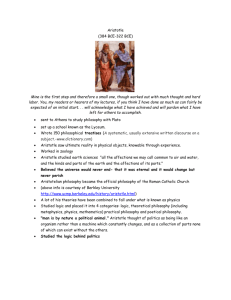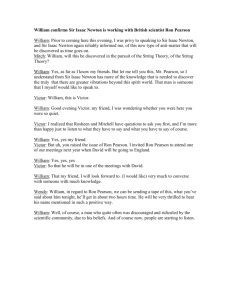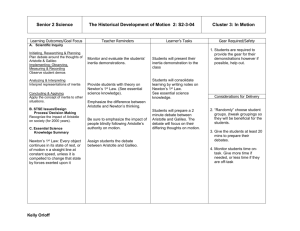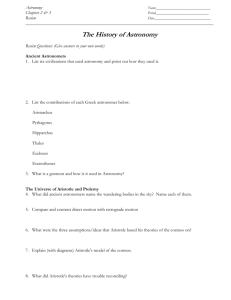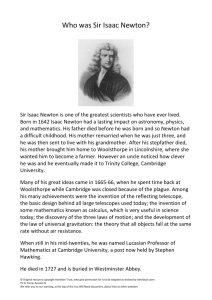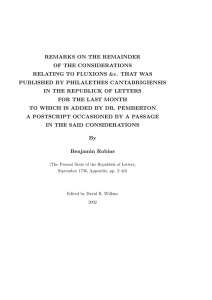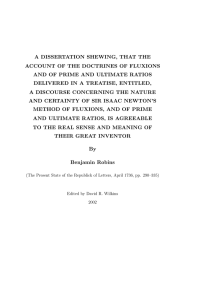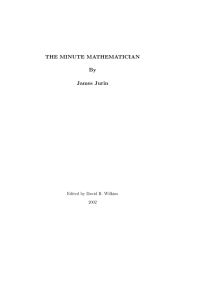History 2 - Enlightenment Thinkers research paper and group project
advertisement
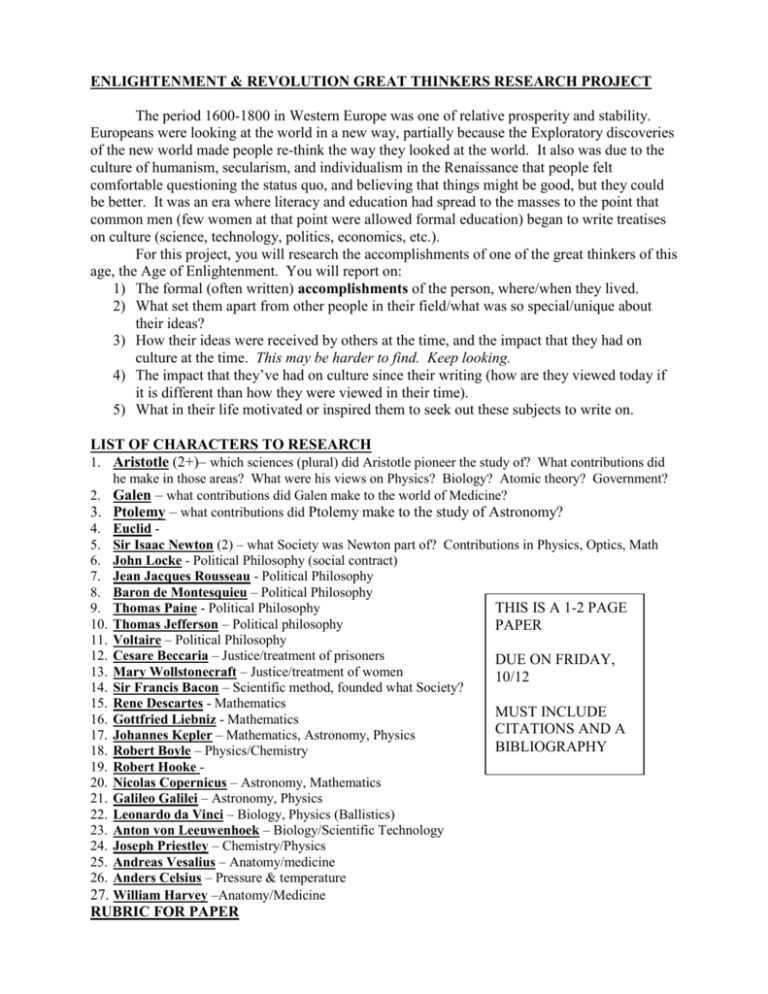
ENLIGHTENMENT & REVOLUTION GREAT THINKERS RESEARCH PROJECT The period 1600-1800 in Western Europe was one of relative prosperity and stability. Europeans were looking at the world in a new way, partially because the Exploratory discoveries of the new world made people re-think the way they looked at the world. It also was due to the culture of humanism, secularism, and individualism in the Renaissance that people felt comfortable questioning the status quo, and believing that things might be good, but they could be better. It was an era where literacy and education had spread to the masses to the point that common men (few women at that point were allowed formal education) began to write treatises on culture (science, technology, politics, economics, etc.). For this project, you will research the accomplishments of one of the great thinkers of this age, the Age of Enlightenment. You will report on: 1) The formal (often written) accomplishments of the person, where/when they lived. 2) What set them apart from other people in their field/what was so special/unique about their ideas? 3) How their ideas were received by others at the time, and the impact that they had on culture at the time. This may be harder to find. Keep looking. 4) The impact that they’ve had on culture since their writing (how are they viewed today if it is different than how they were viewed in their time). 5) What in their life motivated or inspired them to seek out these subjects to write on. LIST OF CHARACTERS TO RESEARCH 1. Aristotle (2+)– which sciences (plural) did Aristotle pioneer the study of? What contributions did he make in those areas? What were his views on Physics? Biology? Atomic theory? Government? 2. Galen – what contributions did Galen make to the world of Medicine? 3. Ptolemy – what contributions did Ptolemy make to the study of Astronomy? 4. Euclid 5. Sir Isaac Newton (2) – what Society was Newton part of? Contributions in Physics, Optics, Math 6. John Locke - Political Philosophy (social contract) 7. Jean Jacques Rousseau - Political Philosophy 8. Baron de Montesquieu – Political Philosophy 9. Thomas Paine - Political Philosophy THIS IS A 1-2 PAGE 10. Thomas Jefferson – Political philosophy PAPER 11. Voltaire – Political Philosophy 12. Cesare Beccaria – Justice/treatment of prisoners DUE ON FRIDAY, 13. Mary Wollstonecraft – Justice/treatment of women 10/12 14. Sir Francis Bacon – Scientific method, founded what Society? 15. Rene Descartes - Mathematics MUST INCLUDE 16. Gottfried Liebniz - Mathematics CITATIONS AND A 17. Johannes Kepler – Mathematics, Astronomy, Physics BIBLIOGRAPHY 18. Robert Boyle – Physics/Chemistry 19. Robert Hooke 20. Nicolas Copernicus – Astronomy, Mathematics 21. Galileo Galilei – Astronomy, Physics 22. Leonardo da Vinci – Biology, Physics (Ballistics) 23. Anton von Leeuwenhoek – Biology/Scientific Technology 24. Joseph Priestley – Chemistry/Physics 25. Andreas Vesalius – Anatomy/medicine 26. Anders Celsius – Pressure & temperature 27. William Harvey –Anatomy/Medicine RUBRIC FOR PAPER SCORE 5 4 3 2 1 CONTENT (80%) All 5 Content standards are met completely 4 of 5 standards are met completely 3 of 5 standards are met completely 2 of 5 standards are met completely 1 of 5 standards are met completely PAPER QUALITY (20%) - paper organization in to proper paragraphs content standards are well organized and clear Spelling, grammar do not interfere with readability Student name, date, period, and paper subject are stated clearly atop the front page or title page. EVOLUTION OR REVOLUTION? People always seem to remember the “big moments” in life, and the person who most contributed during that moment as a “great person” or a single “great act”. Maybe if we stopped to think about how we built up to those big moments we’d be able to have more (or less) of them . . . or at least appreciate more people in our lives. For this project, you and your group are to examine the evolution of thought. Each of you has researched one great thinker. Now, you will look at them as groups of thinkers who influenced each other. You must make strong connections between them to see how the thoughts of one influenced the ideas of another. We recall Sir Isaac Newton’s quote “If I have looked farther, it is because I have stood on the shoulders of giants.” GROUP 1 GROUP 2 Aristotle Sir Francis Bacon Sir Isaac Newton Robert Boyle Robert Hooke Joseph Priestley Anders Celsius GROUP 4 Galen Leonardo da Vinci Andreas Vesalius William Harvey Anton von Leeuwenhoek GROUP 3 Aristotle (e) Euclid Rene Descartes Gottfried Leibniz Sir Isaac Newton Aristotle Ptolemy Nicolas Copernicus Johannes Kepler Galileo Galilei GROUP 5 Aristotle John Locke Sir Isaac Newton Jean Jacques Rousseau Voltaire Thomas Paine GROUP 6 Cesare Beccaria Mary Wollstonecraft Jean Jacques Rousseau Baron de Montesquieu Thomas Jefferson You and your group must submit a poster board with the following: 1) Establish the proper connections between each of the people studied. Each person will not connect to all others directly, though each will connect to at least 1 other directly. The connection may not be spelled out for you in your research – you may need to figure it out based on their individual contributions and the time period/geographical location of their discoveries (For example, if 1 person wrote an influential book in 300 B.C. in Greece, chances are he influenced people in that field that studied afterwards). 2) A creative AND logical way to visually demonstrate whose ideas influenced whom. The connections must be explicitly clear and easy to follow (nobody need be present at the poster to explain what you’ve diagrammed). 3) Approximately 1 short paragraph of information about each of the people, explaining who contributed to their ideas, what their ideas were, and the impact their ideas had. 4) A clear picture of each person. THE FOLLOWING IS A SCORING RUBRIC FOR THIS PROJECT SCORE CONTENT PRESENTATION QUALITY 5 Information on all people was complete, all connections were clear and easy to understand Information or connections lacking in detail on 1 or 2 of the philosophers 1 person completely lacking or many philosophers info/connections lacking in detail Significant information missing on both philosophers and connections It looks like you tried to do it all last night The layout of the presentation showed effort, was visually pleasing, and aided students in understanding the content. Layout shows effort but lacks creativity OR does not significantly aid understanding (but does not interfere with it) Effort clearly lacking OR layout is difficult to follow, hindering student learning Effort lacking and layout lacks creativity as well as being difficult to follow. It looks like you tried to do it all last night 4 3 2 1
